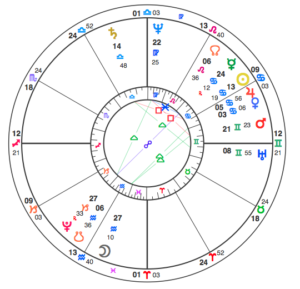 As the new year began, a lot of people were watching a movie about the annihilation of Earth. “Don’t Look Up” is a wake-up call movie, that’s clear.
As the new year began, a lot of people were watching a movie about the annihilation of Earth. “Don’t Look Up” is a wake-up call movie, that’s clear.
What isn’t so clear is how wake-up-able its audience is.
Life as parody
It must be galling to make satirical art in a society where every headline already reads like a joke. How do you improve upon the dark humor of a country where captains of industry argue over whether saving the planet makes economic sense? Why bother to parody late-stage capitalism when, in real life, monster cigarette maker Philip Morris has bought out an asthma-inhaler maker? How do you satirize an electorate that chose as president a failed casino owner who bragged about picking out “person, woman, man, camera, TV” in a dementia test?
You almost feel like this is a movie that might change things! People might see this and realize … but no. [Director Adam McKay] is lampooning a segment of the public that is beyond the reach of satire. – Mick LaSalle
The situation calls to mind what Orwell said of H.G. Wells, who found himself unable to write convincing futurist fantasies after the rise of Nazism. “He was too sane a man to understand twentieth-century craziness; the world had outstripped his imagination.”
“Don’t Look Up” focuses on the American public, reacting to a fictional asteroid pretty much the way many of us are reacting to climate catastrophe. Instead of banding together to avert planetary destruction, people fritter away their last days in a frenzy of finger pointing, abetted by a corporate media that presents existential fact as a hot potato in the culture wars.
Culture wars
But I don’t know if the phrase “culture wars” goes far enough to describe the degree of partisanship we have here. Historically, enemies in wartime have harbored at least some shared assumptions, whereas this collective conversation seems to lack any shred of consensus.
enemies in wartime have harbored at least some shared assumptions, whereas this collective conversation seems to lack any shred of consensus.
In the blood-and-spit cockfight that passes for our public discourse, every issue devolves to party affiliation. No subject is beyond the reach of this dumbed-down framework. Even basic notions about being human — good old-fashioned values like simple decency (for example, the unspoken injunction against a politician calling a prisoner-of-war a “loser” for having been “caught”) — are tagged as either red or blue.
 I’ve been thinking about how our ancestors handled the culture wars of their time. No doubt most people took their cue from a given team identity (tribal, religious, whatever), as they do now. But it strikes me that the thinkers we look back upon as heroes, and the societies we now admire as healthy and sane, arrived at their ethical values more inwardly and independently, with instincts they had matured through self-reflection.
I’ve been thinking about how our ancestors handled the culture wars of their time. No doubt most people took their cue from a given team identity (tribal, religious, whatever), as they do now. But it strikes me that the thinkers we look back upon as heroes, and the societies we now admire as healthy and sane, arrived at their ethical values more inwardly and independently, with instincts they had matured through self-reflection.
…as Thomas Paine put it, in his speech against executing the King, …the choice was never between [radicals and reactionaries]. The choice was … between humanity and cruelty. – Adam Gopnik
Here and now
Be that as it may, as individuals we must cope with the groups we inhabit. We must speak their languages, if not to agree, then to question.
The first step is always to dispassionately acknowledge what’s happening. For Americans that means confronting the fact that we’re part of a mass mind that’s stuck in binary reductionism. We identify the dilemma: How to engage with a social environment in which opposing one’s perceived ideological enemies is the only game in town, and visceral reactivity is the only tool of discourse .
.
Kyle Rittenhouse’s Tears are the Secret Ingredient in Chick-fil-A Sauce
The conventional media is no help. It doesn’t know how to handle the abyss between the two sides in this civil war, and acts as if it’s still just about differences of opinion. But we know that ship has sailed. Political debates, once about policy decisions and spending priorities, have devolved into an inability to agree even about what constitutes factual reality.
It’s a devolution that has picked up speed quite recently. A scant few decades ago, for instance, “anti-fa” would have been the opposite of an accusatory term, because all law-abiding citizens were anti-fascist.
Trying to murder elected officials, on the other hand, or gunning down strangers at a protest, would have been considered unambiguously abhorrent, not a gesture of populist heroism to be rewarded with offers of congressional internship.
The media
Some aspects of this madness have been around since time immemorial. Lynch mobs, like the one last January 6th, have existed throughout the ages. And there have always been powerful agencies eager to exploit mobs, as a source of cheap, available energy.
 In the industrial era, the scapegoating impulses of angry citizens have been good for business. There was an example of this in the recent bio-pic “Being the Ricardos”. The Hollywood gossip columnist who smeared Lucille Ball as a communist knew the news would sell papers to his righteous readers.
In the industrial era, the scapegoating impulses of angry citizens have been good for business. There was an example of this in the recent bio-pic “Being the Ricardos”. The Hollywood gossip columnist who smeared Lucille Ball as a communist knew the news would sell papers to his righteous readers.
Others aspects of the current folly appear to be unique to our time and place, making them, from a karmic perspective, deserving of our special attention. For example, the difference between the way news whips around the globe now, vs. in the days of newspapers and radio. By stoking mass vitriol, Facebook and the cable networks have learned how to strike far more ratings gold than was ever possible with the old media.
Another difference between then and now: the angriest among us have automatic weapons.
But the biggest difference is of course the specter of environmental catastrophe, which looms in the background of everything else — whether through conscious realization or reptile-brain pick-up. Earth has had mass extinctions before, but never one caused by homo sapiens, nor any that happened this fast. Pre-humanity, they took place over tens of thousands of years. This one is happening over decades.
Like the asteroid in the movie, this disaster makes mincemeat out of our ideological disputes. It’s a fatally inclusive resolution to all our divisions.
Pluto comes home to roost
Against this global crisis, the shit storm going on in the USA stands out. For the first time in 250 years – that is, since this group entity was born — Pluto (breakdown) in Capricorn (bedrock social norms) has returned to its original position in the country’s chart. The transit that astrologers have been writing about for years is finally peaking, this year and next.
Jupiter, conjunct the US Sun, is the planet of excess. When not integrated, it augurs growth without bounds, e.g. the modern world’s approach to consuming resources. Pluto has exposed this worldview as ecocidal.
The great American Experiment is in its death throes, a gradual process. (In real life, as opposed to in movies, decay and regeneration are slow). As a young nation, Uncle Sam took a stab at democracy, morphed into plutocracy, and is now flirting with autocracy. At some point it will turn into something else, per Natural Law.
Jupiter also governs ideology. Its crudest expression is “I’m right and you’re wrong and that’s all there is to it”.(1) Since 2008 a series of transits to the US chart has been handing out righteous megaphones to everybody with a bone to pick, and turning up the volume.
A megaphone in every hand
The urge to oppose everything the other side thinks or says is now so overwhelming that even our survival instincts are being suborned to it. Consider the anti-vaxxers who pull their Covid-stricken loved ones out of the ICU as an act of fealty to MAGA.
From the genuinely freaky worship of child soldier Kyle Rittenhouse to Jesse Watters’ insidious MURDER FAUCI HAW HAW HAW act, inciting and glorifying violence is the hip new trend sweeping through conservative circles… an acceptable political tactic. — Shower Cap’s blog
It’s mostly the rightwing who are brandishing megaphones, but they have counterparts at the other end of the spectrum. These are the leftists drunk on knee-jerk woke-itude, whose critiques of society are mostly confined to “… tearing down statues and  ‘editing’ Mark Twain.” (2) This is mere window-dressing, says Morris Berman, author of Dark Ages America, and it fails to go to the heart of the matter.
‘editing’ Mark Twain.” (2) This is mere window-dressing, says Morris Berman, author of Dark Ages America, and it fails to go to the heart of the matter.
The loudest culture warriors in both camps are foes of context and nuance. The racists want to whitewash history, the cancelers want to censor J.K. Rowling. Both groups claim the mantle of Uranus: champions of freedom who pride themselves on taking bold, unpopular stands.
But their impulses more closely resemble that of shadow Saturn, unoriginal and reactive.
Resignation and petulance
Those Americans who aren’t venting their rage appear to be either staggering around in languid resignation or withdrawing in petulant cynicism. This segment of the population doesn’t engage with the news, claiming their mental health depends upon blocking out reports of plastic in the oceans or war crimes in Eritrea. But they might check in with their newsfeeds to see the latest crop top Kylie Jenner rocked at the Influencer Awards.
cynicism. This segment of the population doesn’t engage with the news, claiming their mental health depends upon blocking out reports of plastic in the oceans or war crimes in Eritrea. But they might check in with their newsfeeds to see the latest crop top Kylie Jenner rocked at the Influencer Awards.
Then there’s another group, the old-school liberals, who spend a lot of time vaguely wishing that our elected officials would just get along with each other. They identify — albeit with a bloodless lack of confidence — with the status-quo Democratic party, that clique of kingmakers whose job is to make sure candidates like Bernie Sanders never reach the seat of power.
These voters, and the media they follow, also make an appearance in “Don’t Look Up”, which “skewers the vanity of self-styled reasonable people, who think that finding a middle position between rationality and stark-raving lunacy represents moderation.” (LaSalle).
Plutonian divorce
Years before the break up of Soviet Russia, astrologer Liz Greene noticed Pluto heading towards its Sun in 1991 and speculated that the union would get a divorce. Morris Berman is not an astrologer, but makes a similar observation about the USA.
America… will fall apart, perhaps into separate sections of the country (via secession), and this might offer the hope of some regional rejection of the American Way of Life, which has become, truth be told, a Way of Death. This is probably a few decades down the line, but as far as I can see, it offers the only glimmer of hope possible.
Historical artifact
I consider “Don’t Look Up” significant not in work-of-art terms but in historical-artifact terms. It’s a movie that had to be made.
Imagine if it had not been made. What would it would say about humanity, if this moment in our history failed to produce a movie like this? If the human race is still around in a millennia or two, trying to piece together how the serious thinkers of our era viewed what was happening, imagine how remiss it would seem that more movies like this weren’t being made. Wouldn’t they find it odd that car crash movies and rom-coms were our preferred means of holding up a mirror of our times?
As for the other cultural artifacts future archeologists might uncover, the mind reels.
 What will they make of the attention we lavish on data pellets such as a Real Housewife bouncing a check? What meaning will they confer upon the thousands of “likes” elicited by “Let’s Go Brandon”? (3)
What will they make of the attention we lavish on data pellets such as a Real Housewife bouncing a check? What meaning will they confer upon the thousands of “likes” elicited by “Let’s Go Brandon”? (3)
The cycles of Terra
Scientists say the Earth is middle-aged. It’s 4½ billion years old and likely to live another 4½ billion years. In the 3+ billion years since it has hosted life, there have been eighteen major extinctions, five of them really big ones. Afterwards, every time, enough hardscrabble life forms survived to fill old niches and create new ecosystems out of dead zones.
These repopulations took millions of years. But from the perspective of deep time, what are a few epochs?
Only from the narrow perspective of our own little lifetimes, or of our species’ existence on Earth — a mere blip in the geologic time scale — do such processes seem unimaginably long. Such is the myopia of the human mind. If a timeframe is so vast it doesn’t apply to our own lives, or even to our grandchildren’s, we won’t waste our curiosity on it.
Morphing into something else
But we could all use a bracing jolt of perspective right now, and stretching our minds with the geologic time scale can be a remedial exercise. Just like astrological megacycles, deep time is expansive enough to accommodate this historical moment.
It speaks volumes that cutting-edge science and age-old mysticism reiterate the same incontrovertible truth: that nothing lasts forever; everything morphs into something else. (4) Both viewpoints maintain that everything is energy, and that energy cannot be created nor destroyed; it just changes form. Deny our mortality though we may, you and I are not exempt from this law. Neither are countries, species, or planets.
Deny our mortality though we may, you and I are not exempt from this law. Neither are countries, species, or planets.
From the soul’s point of view, times of emergency are a cosmic ploy to get us to straighten out our priorities, speak our truth and live from the core of our beings. As if our lives depended on it.
Notes
1) At best, Jupiter blesses the native with a fresh-faced positivism, e.g. the aw-shucks openness that is part of our national stereotype. But the immature side of Jupiter, in individuals and in groups, is grandiosity. It shows up as big, ignorant ideas: moral absolutism, religious demagoguery, shining-city-on-a-hill exceptionalism.
2) One approach to the diversity critique, as Louis Menand has written, is “to acknowledge the biases and prejudices of the times in which a book was written but to assume that we can hold our own values constant as we encounter minds from an earlier era. …some differences from our own ways of thinking are not so desirable but ought not to put a work on the Index of Forbidden Books.”
3) The question is probably moot, since who knows if future historians will even be able to find, let alone wade through, the insane glut of data we are chaotically pumping into the cybersphere. Do you ever wonder how anthropologists 200 years from now, combing through the rubble of today’s civilizations, would even know about the existence of this ocean of digital information, let alone possess the hardware and software to decode it? We can’t even get into our CDs from a few decades ago. If some advanced race does come along to investigate us, post-extinction, don’t you bet that what they’ll seize upon is the old hardcover books? Better yet, the engraved stone tablets in the remains of our museums.
If they do somehow find out about the monster data servers that we euphemistically call “the cloud,” they will certainly wonder why our species, in the midst of a climate disaster, believed that a storage technology that burns more fossil fuels than entire countries was the best option.
4) Remember ten years ago, when the Mayan calendar was supposed to end? Some people took this to mean that in 2012 the world would, I don’t know, just come to a halt. (Did they think that everything would suddenly go black? When we’re children, that’s what we imagine death must be like.) But even the meteor that killed the dinosaurs, the most recent mass extinction, took a long time to cull the herd, and left plenty of life in its wake. It was that calamity that jump-started the age of mammals and gave rise to you and me.

